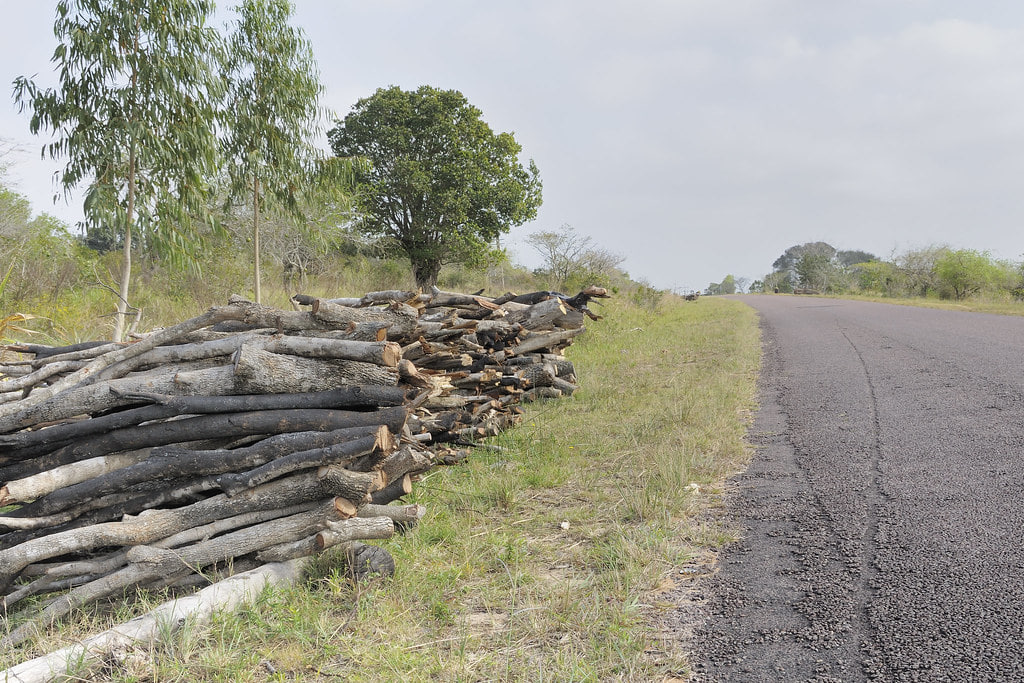Smugglers selling timber to China are financing Islamic State-backed insurgents in Mozambique’s northern Cabo Delgado province, according to a report published today by the US NGO the Environmental Investigation Agency (EIA).
According to the report, the insurgent-linked timber exports are part of a wider trade in which hundreds of thousands of tonnes of timber are being illegally exported to China every year, in defiance of Mozambican law and an international treaty on endangered wildlife. Under domestic law, the export of all unprocessed timber logs of any species is banned, as is the export of certain endangered species of wood in any form.
Several sources told EIA that insurgents are personally involved in cutting timber and selling it onward to Montepuez, where it is mixed with other wood and sold for export, according to Alexandra Bloom, senior trade and policy analyst at EIA.
The report refers to anonymous sources who claim that insurgents use middlemen to traffic logs across the province, usually to Montepuez district, where they are sold to Chinese businesses such as CAM International and Mozambique First International Development, both of whom have a history of handling illegally traded timber.
“Chinese traders and insurgents are deliberately obfuscating the link between each other by using Mozambican brokers and middlemen,” Bloom told Zitamar News.
EIA points to five districts of Cabo Delgado where illegal logging largely takes place: Montepuez, Balama, Namuno, Mueda and Muidumbe. However, it is unclear to what extent insurgents may be currently involved with such activity as none of these districts have been occupied by insurgents since at least 2022, with the exception of southern Muidumbe.
In Muidumbe, the report adds, a 10,000-hectare timber concession is controlled by Isabel Nkavandeka, a former government minister and “influential” politician in ruling party Frelimo, which as at 2023 was still operating and producing endangered species banned from export. It has been alleged that Nkavandeka’s export licence was used in 2021 to illegally export timber to China which was then returned to Mozambique, but while nine people were reportedly charged, she was not.
Illegal timber exports made into luxury goods
Over 89% of timber exports from Mozambique to China between 2017 and 2023, amounting to 3.7m tonnes, likely violated Mozambique’s national log export ban, with much of this wood sourced from insurgent-held areas, the report says. About 65% of the timber exported from the port of Pemba violates the ban. One source reportedly told EIA that 30% of the timber logged in Cabo Delgado is at high risk of coming from insurgency-occupied forests.
The EIA says its investigators spoke to a Chinese minerals and timber trader, Yu Guofa, whom sources call the “cabeça grande” or kingpin of illegal logging. Yu admitted to them that about half the timber he sold was unprocessed, making its export illegal. He also sells timber from protected species. Yu is said to have timber concessions in Chapa, Montepuez district, and in the Mueda and Nangade areas.
The smuggling of illegal timber through Mozambique’s ports is facilitated by bribery and corrupt arrangements between traders and local officials, government ministries, and police and security officers, according to the report. On one occasion, it says, customs officials were bribed about MZN80,000 ($1,250) to approve the packing of over 80 containers of illegal logs, including species specifically banned from export.
“The process of transport to the port and export is handled by traders, mostly Asian, who have for years worked together to launder illegal timber and exported logs in breach of the log export ban,” Bloom said.
The EIA also accuses major shipping lines, including CMA CGM, Maersk, and MSC, of complicity in shipping illegal timber to the Chinese market, where Mozambican wood, such as pau-preto, also known as African blackwood or hongmu in China, is highly valued as material for luxury furniture and decking. Timber which is bought from loggers for “a few dollars” is made into furniture retailing for tens of thousands.
The investigation found that protected species of Mozambican timber are often openly advertised on social media and chairs made from pau-preto were even used in the 2016 G20 summit in Hangzhou. According to the report, the vast majority of pau-preto imported by China comes from Mozambique. Under an international treaty, Mozambique is obliged to carry out a study showing that the export of the endangered wood would not threaten its survival, but no such studies have been carried out, it says.
The EIA recommends that shipping lines suspend the transport of all logs. The agency also calls on the Mozambican government to crack down on institutional corruption and money laundering, while China should punish its citizens for bribing foreign officials and help Mozambique enforce its log export ban.









